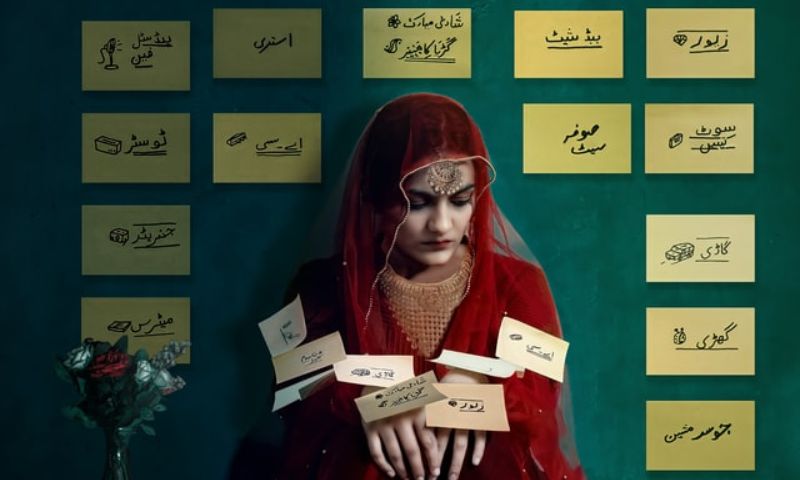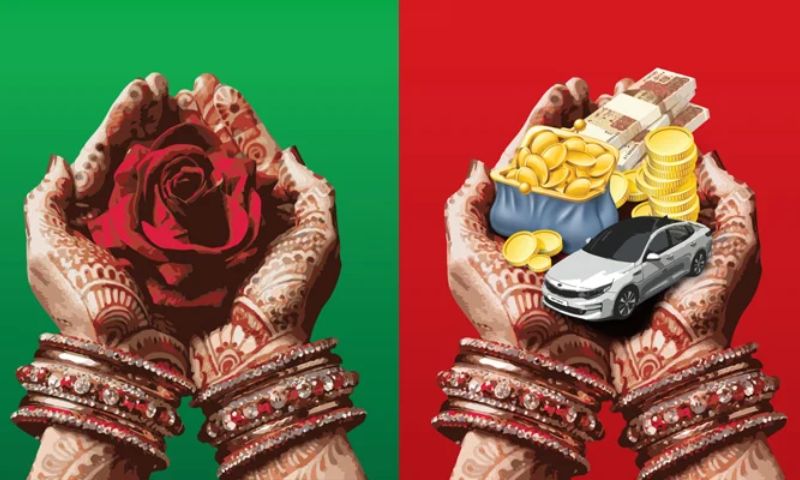In today’s society, news stories that shock and sadden us are all too common. Incidents such as a daughter-in-law being burned for not bringing enough dowry, divorces, expulsions from homes, murders are part of the daily routine for many.
According to a report by the United Nations last year, 22 million young men and women in Pakistan are waiting to get married. This staggering number indicates a deep-rooted issue within the societal and cultural frameworks governing marriage in the country. The lack of suitable matches often leads parents to marry off their children to cousins. When cousin marriages are not feasible, parents may consider matches outside their caste or community, but they often hesitate due to concerns about reliability and social compatibility.
One of the most significant social evils contributing to this crisis is the practice of dowry. Dowry, a long-standing tradition, has become a major barrier to marriage, especially for girls from poor families. The desire for dowry is a manifestation of greed on the part of the recipient and compulsion on the part of the giver. This practice not only reinforces gender inequality but also imposes a significant financial strain on the bride’s family.
The Burden of Dowry
The concept of dowry dates back centuries and was originally intended as a form of inheritance for the bride. However, over time, it has evolved into a practice that often leads to the exploitation and abuse of women. In Pakistan, the demand for dowry can include cash, jewelry, household items, and even vehicles. This demand places immense pressure on the bride’s family, who may go into debt or sell valuable assets to meet these expectations.
For many poor families, the inability to provide an adequate dowry means their daughters remain unmarried. These women often spend their prime years in their parents’ homes, growing older without prospects for marriage. According to the United Nations report, there are currently 10 million women over the age of 35 in Pakistan who are waiting to get married. This statistic highlights the urgent need to address the dowry system and its impact on women’s lives.
The Social Implications of Dowry
The dowry system not only affects individual families but also has broader social implications. It reinforces gender discrimination, as women are often seen as financial burdens rather than individuals with their own rights and identities. The practice of dowry perpetuates the notion that a woman’s worth is tied to her family’s ability to provide material goods, rather than her own qualities and achievements.
Moreover, the dowry system contributes to the perpetuation of poverty. Families that cannot afford to give a substantial dowry may resort to loans or selling property, leading to financial instability. This cycle of debt can have long-term effects on families, hindering their ability to improve their economic status and exacerbating social inequalities.
Legal and Cultural Challenges
Despite legal provisions against dowry, the practice persists due to deep-seated cultural norms and societal expectations. The Dowry and Bridal Gifts (Restriction) Act of 1976 in Pakistan aims to regulate the giving and taking of dowry, but enforcement remains weak. Social pressures and fear of stigma often prevent families from reporting dowry demands or seeking legal recourse.
Changing these cultural norms requires a multi-faceted approach. Education and awareness campaigns can play a crucial role in shifting attitudes towards dowry. Encouraging community leaders and influencers to speak out against the practice can also help to change societal perceptions. Additionally, empowering women through education and economic opportunities can reduce their dependence on marriage as a means of financial security.
Potential Solutions and Initiatives
Addressing the dowry dilemma in Pakistan requires a combination of legal, social, and economic strategies. Some potential solutions and initiatives include:
Strengthening Legal Frameworks: Ensuring strict enforcement of existing dowry laws and implementing new legislation to protect women’s rights. Providing legal aid and support to families facing dowry-related harassment can also help.
Education and Awareness Campaigns: Launching campaigns to educate communities about the negative impacts of dowry and promoting alternative views on marriage and women’s worth. Schools, media, and community organizations can play a vital role in this effort.
Economic Empowerment of Women: Creating opportunities for women to become financially independent through education, vocational training, and entrepreneurship. Economic empowerment can reduce the pressure on women to marry for financial security and increase their bargaining power within marriage.
Community Engagement: Involving community leaders, religious figures, and influencers in advocating against dowry. Community-driven initiatives can foster collective action and create a supportive environment for change.
Support Systems for Families: Establishing support networks for families facing dowry-related issues. Counseling services, financial assistance, and social support can help families navigate the pressures associated with dowry.
Promoting Positive Role Models: Highlighting stories of couples and families who have rejected dowry and chosen partnerships based on mutual respect and love. Positive role models can inspire others to follow suit and challenge societal norms.
The Role of Men in Combatting Dowry
Men play a crucial role in addressing the dowry problem. As primary beneficiaries of dowry, men must take a stand against the practice and refuse to accept it. Educating boys and young men about the harmful effects of dowry and promoting gender equality can lead to a generational shift in attitudes.
Men who reject dowry and advocate for equal partnerships can set powerful examples for their communities. Additionally, involving men in discussions about dowry and encouraging them to support women’s rights can strengthen efforts to eliminate the practice.
The Psychological Impact of Dowry
The dowry system also has significant psychological implications for women and their families. The pressure to provide a substantial dowry can lead to stress, anxiety, and feelings of inadequacy. For women, the constant comparison to other brides based on the dowry they bring can damage their self-esteem and sense of worth.
Marriages that are heavily influenced by dowry demands often suffer from power imbalances. Women may feel obligated to tolerate mistreatment or abuse because of the financial investment their families have made. This dynamic can lead to long-term emotional and psychological harm.
Conclusion
The dowry dilemma in Pakistan is a multifaceted issue that affects millions of young men and women. It perpetuates gender inequality, financial instability, and social injustice. Addressing this issue requires a comprehensive approach that includes legal reforms, education and awareness campaigns, economic empowerment, and community engagement. By challenging cultural norms and promoting gender equality, Pakistan can create a society where marriages are based on mutual respect and love, free from the constraints of dowry. The journey towards eliminating dowry is challenging, but with collective effort and determination, it is possible to create a brighter and more equitable future for all.



























